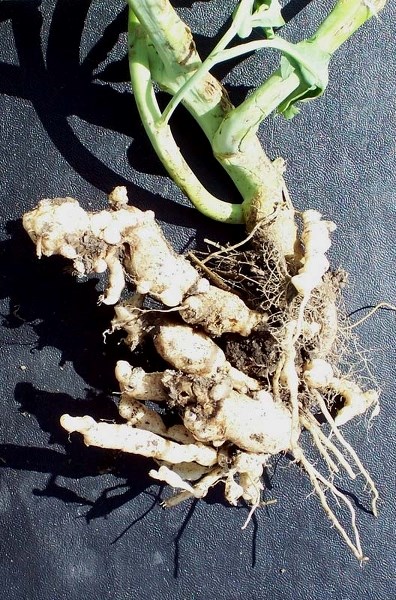When agronomist Dan Orchard dug into a canola field north of St. Albert back in 2003, he pulled up something that wasn’t supposed to be there: clubroot.
Orchard said a farmer had asked him to take a look at a field in Sturgeon County.
“When he went to swath it, the plants were just tipping over,” he said.
Orchard found that the plants’ roots were covered with the ugly, cancerous galls that come with clubroot. It was the first reported case of clubroot on canola in Canada, and the field was packed with it.
Orchard said he knew that this was bad news, but didn’t realize how bad until he talked to some experts.
“I didn’t understand fully the impact it would have and the scope by which it would spread.”
What started as a few dozen fields in Sturgeon has now become thousands in less than a decade, said Clinton Jurke, agronomist with the Canola Council of Canada.
“It’s spreading way faster and more aggressively than anyone would have ever guessed.”
That’s why some of the world’s top plant disease experts are touring Sturgeon County this week as part of the 2013 International Clubroot Workshop. It’s the first time the international event has been held in Canada, and it’s meant to help local farmers and researchers get a grip on this virulent disease.
The federal government has just finished a multi-year research program on clubroot, said Jurke, the workshop organizer, and this four-day event is meant to publicize the results.
“Edmonton is the epicentre of the clubroot in canola problem in this country,” he said, which makes it a great place for this event.
Clubroot is a fungus-like microbe called a protist that infests cruciferous vegetables such as canola, cabbage and broccoli, said Stephen Strelkov, the professor of plant pathology at the University of Alberta who helped Orchard confirm the presence of clubroot in that field back in 2003. (He and Orchard are speakers at the workshop.)
Clubroot-infested plants develop club-like galls on their roots as the parasites drain their hosts of water and nutrients. While there have been no formal studies of its impact in Alberta, Strelkov said international ones suggest that clubroot can topple up to 40 per cent of a canola crop.
“There have been a few cases where it’s been a total crop loss.”
Clubroot reproduces through thick-walled spores that can survive for more than 20 years in the soil, Strelkov said, making it nearly impossible to root out once its established. Erosion, dirty shoes and farm equipment can spread infested dirt far and wide.
Other nations have clubroot in canola, Jurke said, but they haven’t seen the widespread losses we have here.
“We’re kind of dealing with something that’s new.”
This workshop is meant to bring international experts here to see if they can figure out how to manage Alberta’s clubroot.
Farmers are now planting canola that’s resistant to clubroot, said Orchard, who now works for the Canola Council of Canada, and are more aware of the danger it poses, but have yet to stop the disease’s spread.
One problem is sanitation. Farmers can theoretically stop clubroot from spreading by cleaning all the dirt off their clothes, equipment and vehicles before they move between fields.
But that takes about six hours per field, Jurke said, and many farmers can’t afford that kind of time.
High canola prices also encourage farmers to plant the stuff more frequently, Strelkov said, and that raises the risk of clubroot. Farmers are relying on crop resistance to hold the disease back, but that could fail if the disease adapts.
Prevention, education and sanitation would help keep clubroot in check, Orchard said.
While clubroot is regulated under the provincial pest act, he knew of only a few counties that had brought in canola-planting bans for infested fields – some of which were as long as seven years.
Orchard urged farmers to head to clubroot.ca and follow best management practices for clubroot.
“Hopefully, you can at least manage the disease rather than have it manage the farm.”
The conference runs from June 19 to 22 at the Delta Edmonton South hotel in Edmonton. Call Jurke at 306-821-2935 for details.




